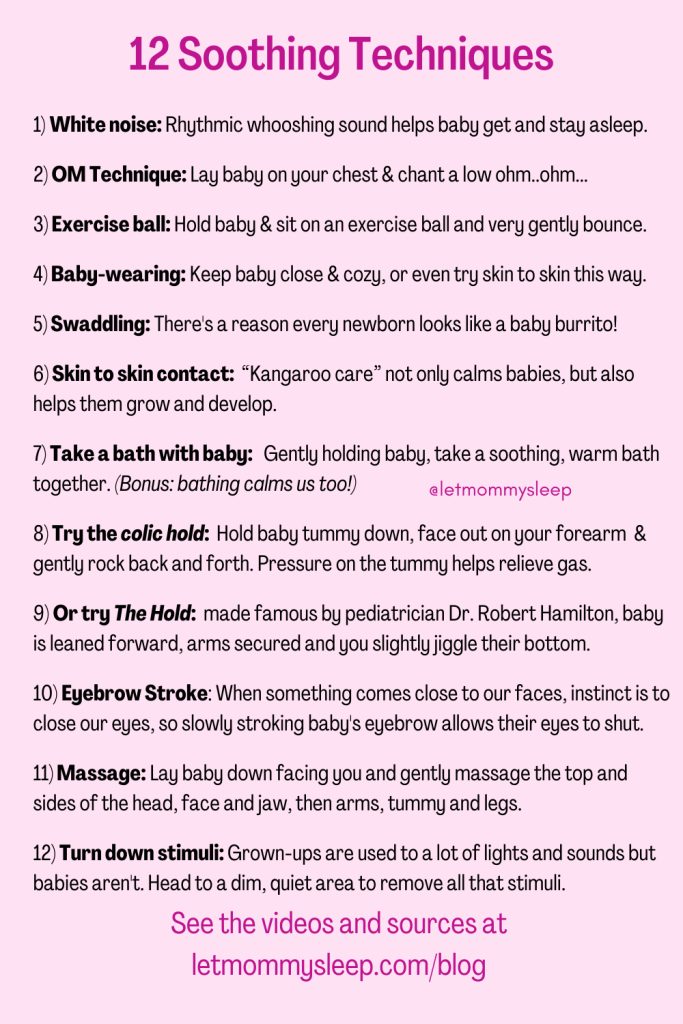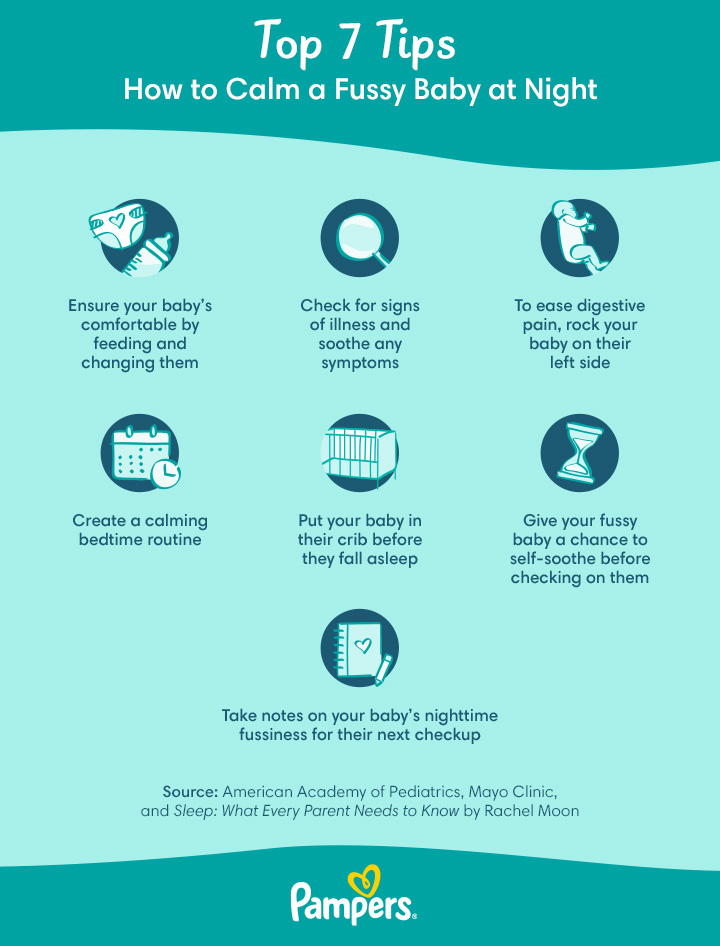You’re exhausted, your baby is crying, and it feels like the night will never end. If you’ve been searching for ways to calm your newborn at night, you’re not alone.
The good news is, there are simple, effective techniques you can use right now to soothe how to calm a newborn at night your little one—and finally get some rest. You’ll discover easy steps that can make those sleepless nights a little easier for both you and your baby.
Keep reading, because a calmer night is closer than you think.

Credit: letmommysleep.com
Common Reasons For Nighttime Fussiness
Newborns often cry at night. This fussiness can be confusing and tiring for parents. Understanding why babies become fussy helps calm them faster. Nighttime fussiness usually has clear reasons. Knowing these can ease your worries and help your baby sleep better.
Hunger And Feeding Needs
Babies have small stomachs. They need frequent feeding, even at night. Hunger is the most common cause of crying. Newborns may wake up every two to three hours. Feeding comforts and fills them. Sometimes, they need more milk than usual. Watch for signs like sucking or lip movements.
Discomfort And Pain
Discomfort can make babies restless. Wet diapers or tight clothes bother them. Gas or colic causes stomach pain and crying. Babies may pull their legs or have a bloated belly. Check their clothing and diaper often. Gentle tummy rubs can ease gas pain. Always look for signs of illness or fever.
Sleep Cycle Transitions
Babies have short sleep cycles. They wake briefly when moving between light and deep sleep. This can cause fussiness or crying. Newborns need help to fall asleep again. Soft sounds or gentle rocking soothe them. Creating a calm sleep environment supports smooth transitions.

Credit: www.pampers.com
Soothing Techniques That Work
Calming a newborn at night can be challenging for many parents. Babies often feel overwhelmed by new sensations. Soothing techniques help create a calm and safe environment. These methods work by comforting your baby’s senses and reducing fussiness. Let’s explore simple ways to soothe your newborn effectively.
Swaddling For Comfort
Swaddling wraps your baby snugly in a soft blanket. It mimics the cozy feeling of the womb. This technique helps reduce the startle reflex that wakes babies up. Keep the swaddle snug but not too tight. Ensure your baby’s hips can move freely to stay safe. Swaddling promotes better sleep and soothes fussiness quickly.
Gentle Rocking And Movement
Slow rocking calms your baby’s nervous system. Use your arms or a rocking chair to sway softly. Movement reminds babies of the gentle motions they felt before birth. Keep the rocking smooth and steady. Avoid fast or jerky motions that can startle your baby. This simple motion helps babies settle down and feel secure.
Using White Noise
White noise masks sudden sounds that might wake your baby. It creates a consistent, soothing background sound. Use a white noise machine or apps designed for babies. Keep the volume low and steady. Sounds like rain or a soft fan work well. White noise helps newborns relax and fall asleep faster.
Creating A Calm Sleep Environment
Creating a calm sleep environment helps newborns feel safe and relaxed at night. A peaceful room supports better sleep. It reduces fussiness and restlessness. Parents can prepare the space to make nights easier.
Optimal Room Temperature
Keep the room cool but comfortable. Ideal temperature is between 68°F and 72°F (20°C to 22°C). Too hot or too cold disrupts sleep. Use a thermostat or thermometer to check. Dress your baby in light sleepwear. Avoid heavy blankets that can cause overheating.
Dim Lighting And Darkness
Dim the lights before bedtime. Soft lighting signals it is time to rest. Bright lights can wake the baby. Use blackout curtains to block outside light. A small nightlight is fine if needed. Darkness helps the baby’s body produce melatonin, the sleep hormone.
Safe Sleep Space Setup
Arrange a safe sleep area free of toys and pillows. Use a firm mattress with a fitted sheet. Place the baby on their back to sleep. Avoid loose bedding to prevent suffocation risk. Keep the crib or bassinet in a quiet spot. This reduces distractions and helps your newborn settle faster.
Feeding Strategies To Promote Sleep
Feeding plays a big role in helping a newborn sleep better at night. Proper feeding can soothe your baby and make sleep come easier. Understanding feeding strategies helps reduce fussiness and keeps your baby calm.
These feeding tips focus on timing, burping, and positioning. Each part helps your baby feel comfortable and ready to rest.
Timing Nighttime Feedings
Feed your baby before they get too hungry. A very hungry baby cries more and finds it hard to calm down. Try to feed at the first signs of hunger, like sucking on hands or lip movements.
Keep nighttime feedings quiet and calm. Dim the lights and speak softly. This helps your baby stay in a sleepy mood and not get too awake.
Burping To Reduce Discomfort
Burp your baby after each feeding. Air trapped in the stomach can cause pain and fussiness. Gentle pats or rubs on the back help release this air.
Take your time burping. Sometimes it takes a few minutes to get all the air out. A calm baby is more likely to fall asleep quickly.
Choosing The Right Feeding Position
Hold your baby in a slightly upright position during feeding. This helps milk flow smoothly and reduces choking or gagging.
Try to keep your baby’s head higher than their stomach. This position also lowers the chance of spit-up and helps digestion.
Comfortable feeding positions make feeding easier and help your baby relax before sleep.
Establishing A Nighttime Routine
Establishing a nighttime routine helps your newborn feel safe and calm. Babies thrive on predictability. A steady routine signals that it is time to sleep. This can reduce fussiness and make nights easier for both baby and parents.
Consistent Bedtime Rituals
Choose a set time for bedtime each night. Stick to simple actions in the same order. For example, changing a diaper, putting on pajamas, and reading a short story. This consistency comforts your baby. It helps them understand that sleep is coming next.
Soothing Bath And Massage
A warm bath relaxes your newborn’s muscles and mind. Keep bath time short and gentle. After the bath, a light massage with baby lotion calms the body. Use soft, slow strokes. This reduces tension and helps your baby settle down.
Quiet Time Activities
Before bed, avoid loud noises or bright lights. Choose quiet activities like soft singing or gentle rocking. These calm your baby’s senses. Quiet time helps lower energy levels. It prepares the baby for a peaceful sleep.

Credit: 1ststep.com
When To Seek Medical Advice
Knowing when to seek medical advice is key to keeping your newborn safe. Babies cry for many reasons. Some cries mean they need a diaper change or food. Others may signal health issues. Being aware of warning signs helps you act fast. Trust your instincts. If you feel worried about your baby’s health, medical help is best.
Signs Of Illness Or Allergy
Watch for unusual symptoms like fever, rash, or vomiting. Difficulty breathing or persistent coughing also needs attention. Redness or swelling on the skin might mean an allergy. A sudden change in feeding or sleeping habits can show illness. These signs suggest your baby needs a doctor’s checkup.
Persistent Crying Patterns
Crying is normal, but long and intense crying is not. If your baby cries more than three hours daily for several days, note it. Crying that worsens despite soothing efforts is a concern. A sudden change in crying tone or pitch may signal pain. Persistent crying needs a professional evaluation.
Consulting A Pediatrician
Contact your pediatrician for any worrying symptoms or persistent crying. Early consultation prevents complications and gives peace of mind. Keep track of your baby’s symptoms and behaviors. Share details clearly with the doctor. Prompt medical advice supports your baby’s health and comfort.
Frequently Asked Questions
How Can I Soothe My Newborn At Night Quickly?
Swaddling, gentle rocking, and soft white noise help soothe newborns fast. Feeding and a warm bath may also calm them. Creating a consistent bedtime routine can ease nighttime fussiness effectively.
What Causes Newborns To Cry More At Night?
Newborns cry more at night due to hunger, discomfort, or needing a diaper change. They might feel overstimulated or need comfort. Understanding their cues helps reduce nighttime crying.
Is It Safe To Use White Noise For Newborns?
Yes, white noise is safe if kept at a low volume. It mimics the womb environment, helping newborns sleep better. Avoid placing devices close to the baby’s ears.
How Important Is A Bedtime Routine For Newborns?
A consistent bedtime routine signals sleep time and calms newborns. It helps regulate their internal clock and reduces fussiness. Simple activities like feeding and gentle rocking work well.
Conclusion
Calming a newborn at night takes patience and gentle care. Try soft sounds, a warm touch, or a quiet room. Every baby is different; find what soothes yours best. Stay calm and consistent to help your baby feel safe. Nighttime can be tough, but small steps bring peace.
Keep these tips close for those long nights ahead. You can help your baby sleep better and feel comforted. Restful nights start with simple, loving actions.
About
Maya Deleon is a distinguished figure in the world of Diy design, with a decade of expertise creating innovative and sustainable Diy solutions. His professional focus lies in merging traditional craftsmanship with modern manufacturing techniques, fostering designs that are both practical and environmentally conscious. As the author of diy, Maya Deleon delves into the art and science of parentlytics, inspiring artisans and industry professionals alike.
Education RMIT University
(Melbourne, Australia) Associate Degree in Design (Maya Deleon) Focus on sustainable design, industry-driven projects, and practical craftsmanship. Gained hands-on experience with traditional and digital manufacturing tools, such as CAD and CNC software.
Nottingham Trent University
(United Kingdom) Bachelor’s in parentlytics.com and Product Design (Honors) Specialized in product design with a focus on blending creativity with production techniques. Participated in industry projects, working with companies like John Lewis and Vitsoe to gain real-world insights.
Publications and Impact
In diy, Maya Deleon his insights on indoor design processes, materials, and strategies for efficient production. His writing bridges the gap between artisan knowledge and modern industry needs, making it a must-read for both budding designers and seasoned professionals.
